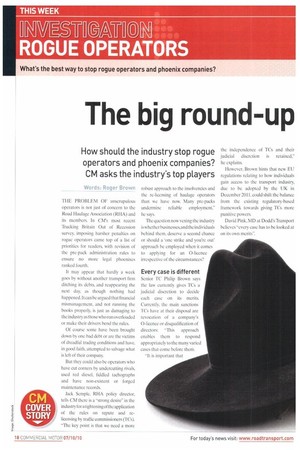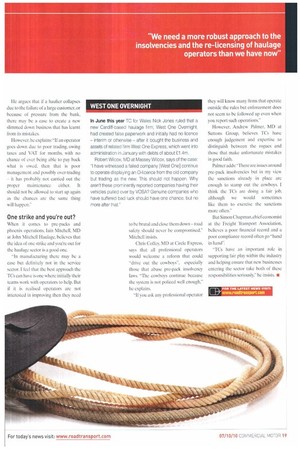The big round-up
Page 18

Page 19

If you've noticed an error in this article please click here to report it so we can fix it.
How should the industry stop rogue operators and phoenix companies? CM asks the industry's top players
Words: Roger Brown THE PROBLEM OF unscrupulous operators is not just of concern to the Road Haulage Association (RHA) and its members. In CM's most recent Trucking Britain Out of Recession survey, imposing harsher penalties on rogue operators came top of a list of priorities for readers, with revision of the pre-pack administration rules to ensure no more legal phoenixes ranked fourth.
It may appear that hardly a week goes by without another transport firm ditching its debts, and reappearing the next day, as though nothing had happened. It can be argued that financial mismanagement, and not running the books properly, is just as damaging to the industry as those who run overloaded or make their drivers bend the rules Of course some have been brought down by one had debt or are the victims of dreadful trading conditions and have. in good faith, attempted to salvage what is left of their company.
But they could also be operators who have cut corners by undercutting rivals, used red diesel. fiddled tachographs and have non-existent or forged maintenance records Jack Semple, RHA policy director. tells CM there is a "strong desire" in the industry for a tightening of the application of the rules on repute and relicensing by traffic commissioners (TCs). "The key point is that we need a more robust approach to the insolvencies and the re-licensing of haulage operators than we have now. Many pre-packs undermine reliable employment." he says The question now vexing the industry is whether businesses,andthe individuals behind them, deserve a second chance or should a one strike and you're out approach be employed when it comes to applying for an 0-licence irrespective of the circumstances?
Every case is different
Senior TC Philip Brown says the law currently gives TCs a judicial discretion to decide each case on its merits. Currently, the main sanctions TCs have at their disposal are revocation of a company's 0-licence or disqualification of directors: "This approach enables them to respond appropriately to the many varied cases that come before them.
"It is important that the independence of TCs and their judicial discretion is retained," he explains.
However, Brown hints that new EU regulations relating to how individuals gain access to the transport industry, due to be adopted by the UK in December 2011, could shift the balance from the existing regulatory-based framework towards giving TCs more punitive powers.
David Pink, MD at Dodd's Transport believes "every ease has to he looked at on its own merits". He argues that if a haulier collapses due to the failure of a large customer, or because of pressure from the bank, there may be a case to create a new slimmed down business that has learnt from its mistakes.
However, he explains; "If an operator goes down due to poor trading, owing taxes and VAT for months, with no chance of ever being able to pay back what is owed, then that is poor management and possibly over-trading it has probably not carried out the proper maintenance either. It should not be allowed to start up again as the chances are the same thing will happen."
One strike and you're out?
When it comes to pre-packs and phoenix operations, lain Mitchell. MD at John Mitchell Haulage, believes that the idea of one strike and you're out for the haulage sector is a good one..
"In manufacturing there may he a case but definitely not in the service sector. I feel that the best approach the TCs can have is one where initially their teams work with operators to help. But if it is realised operators are not interested in improving then they need to be brutal and close them down road safety should never be compromiser Mitchell insists.
Chris Coffey, MD at Circle Express, says that all professional operators would welcome a reform that could "drive out the cowboys", especially those that abuse pre-pack insolvency laws. "The cowboys continue because the system is not policed well enough," he explains.
"If you ask any professional operator they will know many firms that operate outside the rules but enforcement does not seem to be followed up even when you report such operations" However, Andrew Palmer, MD at Suttons Group, believes TCs have enough judgement and expertise to distinguish between the rogues and those that make unfortunate mistakes in good faith.
Palmer adds:"There are issues around pre-pack insolvencies hut in my view the sanctions already in place are enough to stamp out the cowboys. I think the TCs are doing a fair job, although we would sometimes like them to exercise the sanctions more often."
But Simon Chap ma n, chief economist at the Freight Transport Association, believes a poor financial record and a poor compliance record often go "hand in hand".
"TCs have an important role in supporting fair play within the industry and helping ensure that new businesses entering the sector take both of these responsibilities seriously," he insists.
( FOR THE LATEST NEWS VISIT: Er IMMALrOadtranSPOPLCOM




























































































































